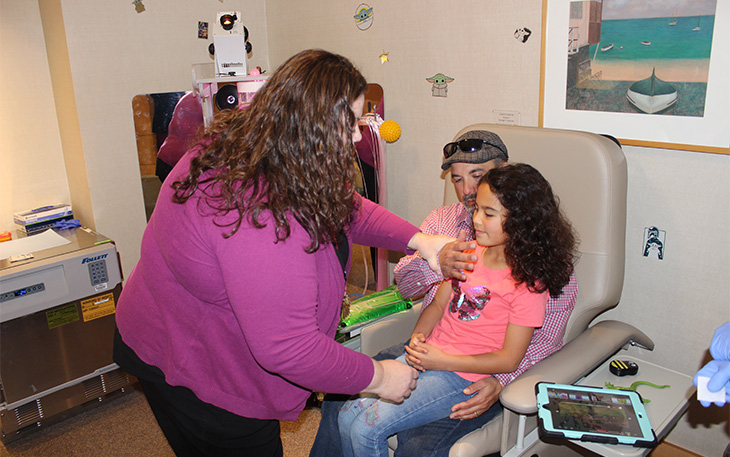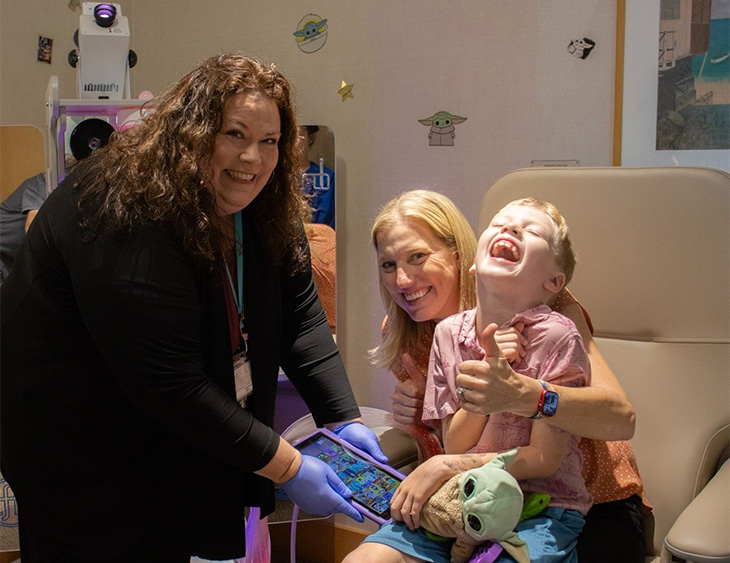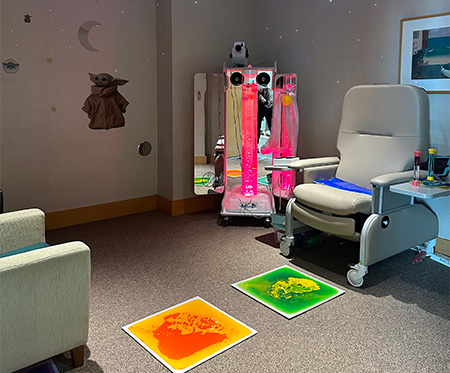Community partners key to success of vaccine clinic focused on neurodevelopmental conditions
COVID-19 and flu PATH vaccine clinic at UC Davis MIND Institute featured in the journal Pediatrics
A new paper shows how partnering with the community can lead to more inclusive health care, especially for individuals with autism and other neurodevelopmental disabilities. The article, published this week in Pediatrics, details the success of a unique COVID-19 and flu vaccine clinic at the UC Davis MIND Institute.

The clinic team includes developmental-behavioral pediatricians, child life specialists, nurses, psychologists, social workers and staff trained to help families navigate health care. The goal is not only to administer vaccines, but to help patients build skills needed to successfully complete medical procedures for the rest of their lives.
Listening to the needs of community members
Autistic individuals and those with other neurodevelopmental disabilities are more likely to experience medical trauma. Their health care needs are more likely to be unmet, and vaccination rates are low.
Co-author Katharine Harlan-Owens is familiar with the challenges. In the paper, she recalled taking her son, who is autistic and has ADHD (attention-deficit/hyperactivity disorder) to a walk-in flu vaccination clinic a few years ago.
“He is very needle phobic, so when the nurse entered the examination room holding a syringe in her hand, he jumped off the table and ran straight into a glass door,” she wrote.
In 2021, she and others at the MIND Institute’s Center for Excellence in Developmental Disabilities asked caregivers, self-advocates and community groups about their health care experiences. They used that feedback to develop the seasonal vaccine clinic.
The authors wrote that “… caregivers consistently described fear about completing recommended health care procedures as their children got older and restraint became more challenging.”
A partnership with families
After fine-tuning the clinic design with input from a community advisory group, the team opened the COVID-19 vaccine clinic in the fall of 2021. It was one day a week for individuals of all ages with neurodevelopmental disabilities.
The authors noted that keys to success included:
- Training providers about neurodiversity and how to support patients
- Meeting with families before their appointment to help them prepare and create an individualized care plan
- Avoiding the use of restraints
- Providing visual and sensory support for patients
- Longer appointments
- Dedicated parking and a separate entrance
- A calm post-vaccination waiting room with incentives (a small toy or snack)
Co-author Erin Roseborough, a child life specialist, noted that longer appointments enable patients to become familiar with the environment and reduce anxiety. “This approach allows staff to use strategies to develop trust, understand communication styles and build positive interactions with a patient and caregiver prior to the procedure.”
A team member talked with each family before their appointment using a specialized intake form to create an individualized care plan. They asked about things such as developmental needs, successful coping strategies and preferred items like toys or food. They also shared resources to help families prepare for the visit.
“If a family told us their child liked SunChips and PAW Patrol during the intake, when they arrived, we had PAW Patrol playing on a tablet and SunChips on the table, and they also happened to get a vaccine,” wrote developmental-behavioral pediatricians Van Ma and Scott Akins in the paper.
Ma is the lead author and Akins, a co-author, is the medical director at the MIND Institute.

Remarkable results
In the first two years of the COVID-19 vaccine clinic, the team vaccinated 354 people with neurodevelopmental disabilities ranging from age 3 to 75. The success rate — measured by people receiving the vaccine without restraint — was 99.3%.
In 2023, they offered both COVID and flu shots and vaccinated 91 people with a 100% success rate.
This year, both vaccines are again offered, most Fridays through Dec. 20. Call 916-703-5555 to make an appointment; walk-ins are not allowed.
“The success rates were much higher than we anticipated,” wrote Ma and Akins. “This initiative taught us the value of creating long-term partnerships that are truly patient and family-led and rooted in the expertise of those with lived experience.”
Harlan-Owens brought her autistic son to the vaccine clinic at the MIND Institute. She was nervous, given his previous negative experience.
At first, he hid behind a table, crying. But with the help of the child life specialist, sensory support and a nurse who made sure he never saw a needle, he was successfully vaccinated.
“Our experience shows the power one positive vaccination experience can have,” she wrote. “He is now able to tolerate vaccinations in his pediatrician’s office and even in busy, loud pharmacies.”

Building on the clinic’s success
As a result of lessons learned in the clinic, UC Davis Health has launched the PATH (Promoting Accessibility To Healthcare) Program. The Children’s Miracle Network-funded project aims to improve health care experiences for neurodiverse children and their families throughout the health system. This also includes a specialty blood draw clinic.
Additional co-authors included Veronica Tuss, Melissa Mello and Aubyn Stahmer, all of UC Davis.
Related Resources:
- Read the full paper, “A Vaccine Clinic for Individuals with Neurodevelopmental Disabilities.”
- New COVID and flu vaccine clinic for individuals with autism ADHD and other conditions
- New blood draw clinic benefits youth with autism and other neurodevelopmental conditions
- Learn more about PATH
- Learn more about the vaccine clinic or make an appointment
The UC Davis MIND Institute in Sacramento, Calif. is a unique, interdisciplinary research, clinical, and education center committed to deepening scientific understanding of autism and other neurodevelopmental conditions. It is a highly collaborative center, bringing together families, researchers, clinicians, community leaders and volunteers with the common goal of developing more personalized, equitable, and scientifically proven systems of support and intervention. The institute has major research efforts in autism, fragile X syndrome, chromosome 22q11.2 deletion syndrome, attention-deficit/hyperactivity disorder (ADHD) and Down syndrome. More information about the institute and its Distinguished Lecturer Series, including previous presentations in this series, is available on the Web at https://health.ucdavis.edu/mind-institute/.



